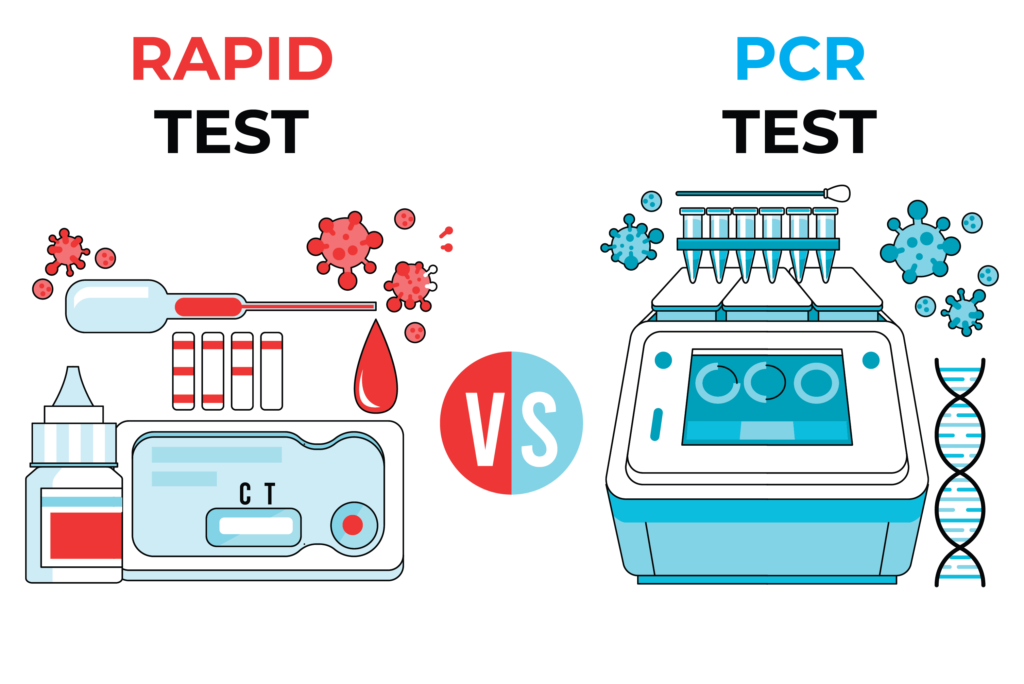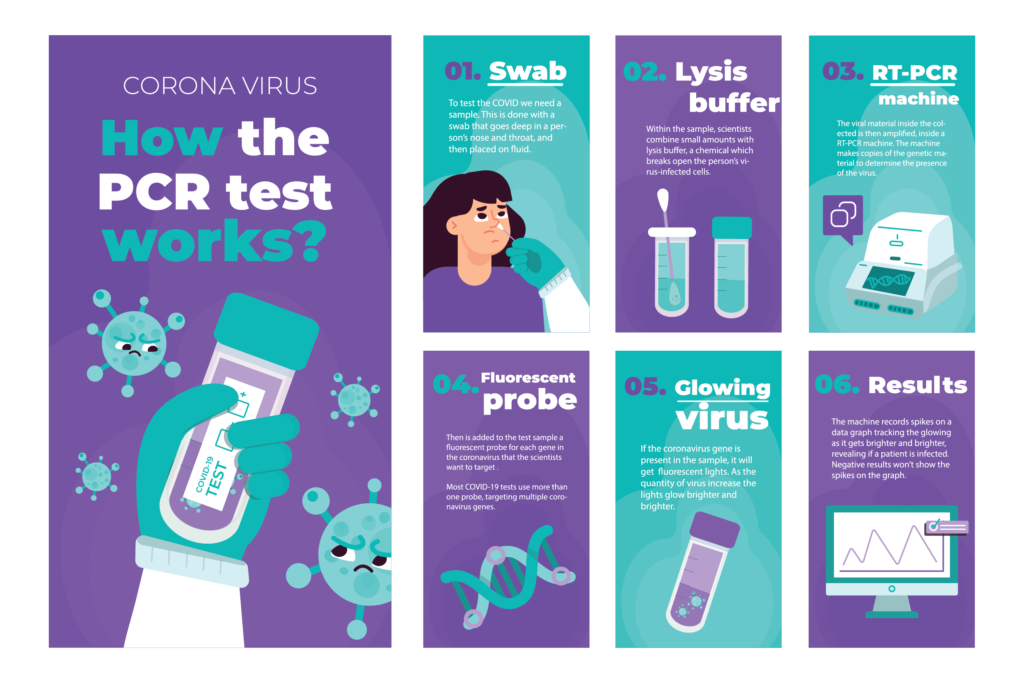Rapid Vs. PCR Testing: Which Should You Choose For Your COVID Test?

Whether you need to submit a routine covid screening test or you’re concerned that you may have been exposed to the virus, reliable test results can give you the peace of mind and clarity you need to navigate your daily life.
And since the onset of the covid-19 pandemic, laboratory testing experts have worked tirelessly to create accurate, easily accessible testing methods that make it easy to screen patients for covid on an on-demand basis.
But with that being said, it’s important to remember that not all covid tests are created equal.
Even with an increased demand for rapid test results, traditional PCR testing still provides the most conclusive and accurate results for anyone looking to put their covid worries to rest.
Today, we’re taking a look at what makes a PCR test so different than the popular rapid antigen test, and why you should always opt for a more reliable testing method when your personal health is at risk.
What Is PCR Testing?
Scientifically speaking, PCR stands for a polymerase chain reaction, which refers to the effect that a virus like covid can have on the genetic material provided in your testing sample.
In practice, PCR tests can be used to identify a number of contagious viruses that may be present in an individual’s system, since they’re used to analyze the actual genetic makeup of the sample, allowing technicians to spot the presence of a foreign substance.
When used in covid-19 testing, a PCR test requires a sample from the patient’s upper respiratory system, which is where the covid virus invades the body.
How Does PCR Work In Covid Testing?

Despite having a reputation for being an uncomfortable experience, providing a sample for a PCR test is actually a relatively fast and efficient process, as long as you have access to a qualified testing site.
Here’s a PCR step-by-step breakdown…
Sample Collection
Since your PCR sample needs to come from your upper respiratory system, the easiest way to extract enough tissue for examination is through a nasal swab.
During this step, the person administering your test will ask you to tilt your head as far back as possible, so that they can reach the test swab far enough into your nasal passageway to collect enough material. And while this might result in some temporary discomfort, a good swab sampling should only take a few seconds and won’t leave you with any nasty side effects.
RNA Extraction
Once the lab has received your sample, they’ll begin the process of extracting RNA from your genetic material. RNA, which refers to ribonucleic acid, is the portion of your living cells that is responsible for communicating DNA instructions from one cell to another.
In other words, RNA is your cellular system’s messenger. By examining it, we can easily see any abnormalities in your cell that may be the result of a virus like covid.
PCR Amplification
Next, lab technicians will need to take a much closer look at your RNA samples to determine exactly what might be causing any perceived abnormalities. To do this, they use what’s known as a PCR amplification.
PCR amplification happens when special enzymes are injected into your sample using a machine called a thermal cycler, which goes through multiple heating and cooling cycles until the RNA cells in your sample have been amplified enough to spot the presence of a virus.
Reliable Results
If there’s even a trace amount of the covid-19 virus in your cells, your PCR test will be able to accurately detect it after the amplification process, even if you aren’t experiencing any symptoms.
Because PCR testing is a more thorough process than other testing methods, you may have to wait anywhere from 24 hours to a few days to receive your result.
How Is PCR Different Than A Rapid Test?
Unlike a PCR test, rapid antigen testing relies less on your genetic material and more on the presence of proteins that may be associated with the covid-19 virus. This is done using chemicals that naturally mimic the antibodies in your immune system, which will alert you to the presence of virus antigens in your sample.
In simpler terms, you can think of your antibodies as the “good guys” and the viral antigens as the “bad guys.” If antigens are present, antibodies will leap into action to identify them fast.
Here’s how an antigen test works…
At-Home Sampling
Similar to a PCR test, you’ll need to get a sample from within your nasal passageway. In most cases, at-home rapid tests will come with thorough instructions for swabbing your nose in the comfort of your home.
Although you may need to enlist the help of a family member if you find yourself struggling to get the swab far enough into your nose on your own.
Test Strip Analysis
Next, you’ll place your sample onto a test strip and then submerge it into a tube of liquid that’s been pre-filled with antibody-mimicking chemicals. Within just a few minutes, these chemicals will work to find any potential antigens in your test sample, often giving you results in as little as 15 minutes.
Antigen Identification
If you have any active covid antigens in your sample, a rapid test will be able to tell you that within a fraction of the time as a lab-based PCR test.
But of course, there’s a catch.
Rapid tests are only designed to detect an active virus in your system, not a virus that may be laying dormant. Since you can still spread covid to others regardless of whether you’re symptomatic or not, these tests can lead to infected individuals continuing to go about their daily activities while unknowingly carrying the virus along with them.
And like with any at-home procedure, the risk of user error with an antigen test is relatively high, which could result in either a rapid test false positive or false negative, especially if the sample you collected was inadequate.
PCR V. Antigen Test: What Are The Pros And Cons Of Both?
Despite advancements in laboratory testing technology, both PCR and rapid antigen tests come with their own unique set of pros and cons. So, before you decide which test you might want to use, it’s essential to weigh the benefits and disadvantages of both options.
These are the pros and cons at a glance…
PCR Testing
Pros:
- Testing is performed by a qualified medical professional
- Nasal swabs only take a few moments when administered by another individual
- RNA samples give a snapshot of any viruses living in your cells
- Amplification allows us to eliminate other viruses, so we can look specifically for a covid-19 infection
- Provides the most accurate covid testing results on the market
Cons:
- Depending on your location, finding a nearby testing site may be a challenge, and you might need to make an appointment in advance
- Results can take several days to be processed, which means you may need to self-isolate in the meantime
Rapid Testing
Pros:
- You can test yourself for covid anywhere, anytime
- Rapid tests are affordable and can be easily purchased online or at your local pharmacy
- Results can be determined in as little as 15 minutes
Cons:
- Performing a nasal swab on yourself can be difficult and leaves lots of room for potential testing errors
- Antigen tests only identify an active virus in your sample, but may not be able to detect a covid-19 infection that is dormant in your system
- Likelihood of receiving a false negative or a false positive is significantly higher than with traditional laboratory testing
Bottom Line?
Getting tested for covid-19 isn’t just about preserving your own health, it also helps reduce the spread of contagious viruses to the most vulnerable members of our community.
That’s why taking the necessary steps to get the most accurate test results possible is crucial to protect ourselves and those around us, even if you haven’t experienced any symptoms yet.
And while the convenience and speediness of a rapid antigen test is an attractive option, especially for those who live extremely busy lives, the reality is that these tests are prone to misleading results, making it difficult to really know if you’ve been infected or not.
PCR tests, on the other hand, remain the gold standard in detected viruses like covid-19 and should always be the top choice for anyone concerned about the health and safety of those around them.
Need Help Finding A PCR Test?
At S&G Labs, we know that finding a reliable place to get your PCR covid test can seem like a stressful process.
And it doesn’t have to be this way.
Thinking about COVID testing for your business? This article takes you through everything you need to know

Since the beginning of the pandemic, our team has worked tirelessly to provide safe, accessible, and affordable PCR testing methods to businesses and individuals alike, so you can spend less time waiting around for your results and more time focusing on the things that matter most.
Discover the S&G Labs difference for yourself today
